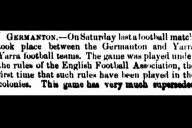Brazil 1 Germany 7
It’s only on a Saturday morning, now three or four days after the event that I can make sense of the whole affair, my refusal or inability to write, or perhaps another bout of writers block, or the fear even that I will not do this justice, or worse that I have run out of things to say, so after trying to start from the beginning and failing to make traction I decide to start from the end, because doesn’t pretty much everyone do this retrospectively anyway? On Wednesday at about 1:00pm, the bloke behind the counter in the hotel lobby asks me if I’ve watched the game, and I say yes, so we discuss the game. He feels bad for Brazil and I want to argue with him, but he seems like a nice guy just doing his job, so it stays polite, and we agree that Germany deserved their win. Before that as I walk through the infuriatingly irregular maze of Sydney’s streets, every TV in a bar with a state of origin poster I pass has SBS’s world cup coverage on, and some of the cafes, too, and I wonder is this a stop gap, just something akin to muzak, is it there for the tourists, or does it represent something more meaningful? Before that, on the plane, no one is talking about the game, at least not in any language I can understand, being more interested in reading their in flight magazines and drinking their coffees, and sir, do do you realise that you have a $5 Jetstar voucher, so why not have a muffin as well. Before that at Tullamarine, there’s the occasional overheard idle chatter about the result, but it’s fleeting. On the drive up to the airport, because my brother is in the car with me the radio is planted on the car’s neutral station, Gold 104.3, which mentions the result during its news break but then gets back to the business of playing classic hits from indeterminate eras, and how come they’re playing Ugly Kid Joe’s version of Cats in the Cradle and not the original? Before that I’m wondering what I could possibly write about this game, because sometimes words are insufficient, and today is one of those days, when even Martin Tyler can’t help but watch in awe, just like my dad and me sitting on the couch watching the Brazilian defence crumble just like I always hoped it would, not out of malice though there is some of that there, too, but because it should have done so several times already this tournament and had not done so, but at least it was to a team playing the right, crisp passing, synchronised team movement, right attitude, right thought, right action.
Netherlands 0 Argentina 0 – Argentina win on penalties
I wake up and go back to sleep countless times in my hotel room on Pitt Street, unfamiliar noises, climate, bed all conspiring to keep me awake, but perhaps also in the back of my mind there are other thoughts, too – like how I would really like to wake up in time and watch this game in full; and also how in a few hours I’m due to present a paper at an Australian literature conference, on sport and specifically soccer in Australian literature and why it shouldn’t be ignored by literature scholars, and how I’m really not happy with how this paper I’m due to present looks, and should I just go ahead with it as it is anyway, should I perhaps wing it, or should I just chop and change material in and out now while I’m here? That’s what I decide to do, even as I dread the reaction of telling literary types that sport is important, that they should take it into consideration especially as it relates to soccer, and I always have a sinking feeling about these things – it’s like telling my soccer mates to read novels, it just doesn’t work, and I always end up alone or near enough to it to feel both superior and distraught. But can you talk about Newcastle coalminers without talking about their sporting interests? Well, of course you can. Can you write about girls and women without mentioning their athletic pursuits or lack of them? Our culture often says they’re not even there. Can you write about Melbourne Greeks without talking about their relationship to social institutions of their own creation which have been around for 40, 50, 60 years and spread across suburbia like a feudal system without a king? Tsiolkas does. And then there are the ethical considerations – sport treats its workers like crap, its supporters as cash cows, even as it siphons attention away from the really important things. Nevertheless I decide to plough on and try to reshape, rewrite and remodel, with the game on the TV behind me, Martin Tyler letting me know when something of interest could maybe possibly happen in this match, but almost nothing of note happens. As extra time approaches I’m begging for a goal, any goal, good, bad, ugly, illegitimate, because I really want to get out of here and pay due respects to the scholar giving the keynote address at this conference I’m at, it’s why I’m here after all, but the game insists on going on and on and on. After nearly three hours of this dross the Dutch bottle the penalty shoot out. The Argentineans aren’t very good, but the Dutch have stretched credulity with their attitude, and eventually this has dragged on so long that a $2 vending machine Wagon Wheels is my breakfast.
















